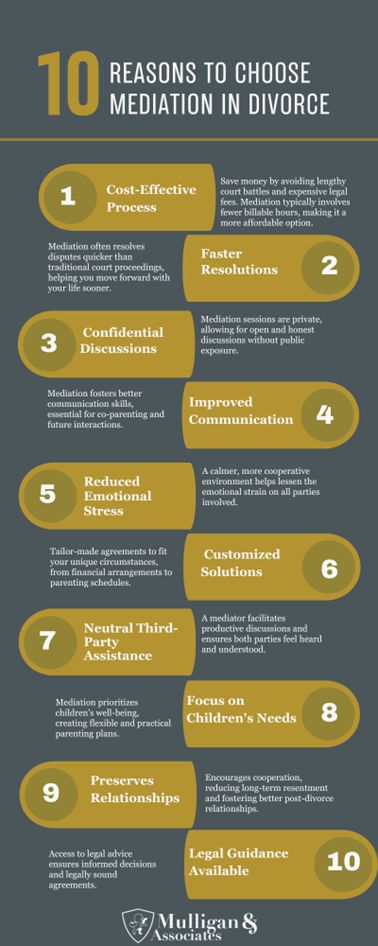Unlocking the Benefits of Mediation in Divorce: 10 Reasons to Choose a Better Path for a Smoother Separation

Divorce can be an arduous process for couples. It often brings stress and conflict. But there’s a way to make it easier. Mediation offers a different approach to ending a marriage.
Mediation helps couples work together to find solutions. It can save time and money and reduce the emotional toll of divorce.
This article looks at ten good reasons to try mediation. These reasons show how mediation can lead to better outcomes for everyone involved.
1) Cost-Effective Process

Divorce mediation offers a cost-effective solution compared to traditional litigation. Couples can save money by avoiding lengthy court proceedings and expensive legal fees.
Mediators typically charge by the hour or session, allowing couples to control costs. The process is often faster than going to court, which means fewer billable hours.
Mediation lets couples share the expense of one neutral third party instead of each hiring separate attorneys. This can significantly reduce the overall cost of divorce.
Working together to reach agreements can help couples avoid the high costs of drawn-out legal battles. They can also save on court filing fees and other expenses associated with litigation.
Mediation’s flexible nature allows couples to focus on their most important issues. This targeted approach can lead to quicker resolutions and lower overall costs.
Mediation’s streamlined process helps couples move forward with their lives more quickly. They can avoid the financial drain of prolonged legal proceedings and start rebuilding sooner.
2) Faster Resolutions

Divorce mediation often leads to quicker settlements than traditional court proceedings. Couples can move through the process at their own pace without being tied to crowded court schedules.
Mediation sessions can be scheduled more flexibly, allowing for faster progress. This reduces the delay associated with drawn-out court proceedings.
Mediation typically resolves disputes in weeks or months, unlike litigation, which can drag on for months or even years. This shorter timeline helps couples move forward with their lives more quickly.
The focused nature of mediation encourages efficient problem-solving. Parties work together to address issues directly rather than getting bogged down in legal procedures.
A speedier resolution through mediation can also reduce emotional stress for all involved, including children. It allows families to adapt to new circumstances sooner.
Couples can avoid the backlog often found in family courts by choosing mediation. This means less waiting and more action towards finalizing the divorce agreement.
3) Confidential Discussions

Divorce mediation offers a private setting for couples to work through their issues. Unlike court proceedings, which are often public, mediation sessions are confidential.
This privacy allows both parties to speak freely without fear of their words being used against them later. They can discuss sensitive topics like finances and child custody arrangements openly.
Professional ethics binds the mediator to keep all information shared during sessions private. This confidentiality extends to any documents or proposals exchanged during the process.
Couples can test out different solutions without worrying about premature commitments. They have the freedom to explore various options before reaching a final agreement.
The confidential nature of mediation also helps protect children from parental conflicts. It keeps personal matters within the family, shielding them from public scrutiny.
This private approach often leads to more honest and productive conversations. Parties may feel more comfortable sharing their feelings and concerns, leading to better outcomes.
4) Improved Communication
Divorce mediation helps couples communicate better. A mediator guides discussions and keeps them on track, creating a safe space for both parties to express their needs and concerns.
Mediation teaches spouses to listen actively. They learn to hear each other without interrupting or getting defensive. This skill is useful during and after the divorce process.
Open communication is key for couples who will co-parent after divorce. Mediation helps them practice talking about tough topics in a calm way. This can lead to better teamwork when raising children together.
Mediators use techniques to reduce conflict. They rephrase negative statements more neutrally, helping couples focus on solutions instead of blame.
The skills learned in mediation can improve future interactions. Couples often find they can handle disagreements more calmly after this process. This can make post-divorce life easier for everyone involved.
5) Reduced Emotional Stress
Divorce can be a highly stressful experience. Mediation offers a way to lessen the emotional toll on both parties.
Emotions often run high in traditional divorce proceedings, which can lead to increased conflict and tension between spouses.
Mediation provides a calmer environment. It encourages open communication and cooperation between the divorcing couple.
The mediator acts as a neutral third party. They help keep discussions focused and productive. This can prevent arguments from escalating.
A key benefit of mediation is preserving dignity and respect. It allows couples to work together rather than against each other.
Mediation can help reduce feelings of anger and resentment. It allows both parties to express their needs and concerns in a safe space.
By choosing mediation, couples often feel more in control of the process. This sense of empowerment can ease anxiety and stress.
The collaborative nature of mediation can also help maintain better relationships post-divorce. This is especially important for couples with children.
6) Customized Solutions
Divorce mediation allows couples to create tailored solutions for their unique situations. Unlike court-based divorces, mediation gives spouses control over the outcome.
Mediators help couples discuss their specific needs and concerns, which leads to agreements that work for both parties and their children.
In mediation, spouses can address unusual circumstances or special requirements. For example, they might create a unique parenting schedule for their work lives.
Financial arrangements can also be customized. Couples may find creative ways to divide assets or handle debt that a court might not consider.
Mediation allows for flexible solutions on issues like pet custody or family heirlooms. These personal matters often get overlooked in standard court proceedings.
The ability to craft personalized agreements often leads to higher satisfaction with the divorce outcome. It can also improve both parties’ chances of following through on their commitments.
7) Neutral Third-Party Assistance
Divorce mediation provides a neutral third party to guide couples through separation. This mediator helps keep discussions on track and emotions in check.
A trained mediator has no stake in the outcome. They don’t take sides or make decisions for the couple. Instead, they facilitate productive conversations.
Mediators help spouses communicate more effectively. They can rephrase statements to reduce conflict and ensure both parties feel heard.
These professionals have experience with common divorce issues. They can offer creative solutions when couples get stuck on a particular topic.
Mediators also keep the process moving. They set agendas for sessions and ensure that all important matters are addressed.
With a neutral party present, spouses often feel more comfortable expressing their needs and concerns. This can lead to more open and honest discussions.
The mediator’s presence can also help balance power dynamics between spouses. They ensure both parties have equal opportunities to speak and be understood.
8) Focus on Children’s Needs
Divorce mediation prioritizes children’s needs. Parents can work together to create parenting plans that address their children’s unique requirements.
Mediators help parents think about schedules, education, and other important aspects of their children’s lives. This approach allows for flexible solutions that fit each family’s situation.
Divorce mediation can protect kids from the stress of courtroom battles. Children benefit when their parents cooperate and make decisions together.
In mediation, parents learn to communicate better about their children’s needs. This skill helps them co-parent more effectively after the divorce is final.
Mediation also gives parents a chance to discuss how to tell their children about the divorce. They can plan how to support their kids through this big change.
9) Preserves Relationships
Divorce mediation helps keep important relationships intact. Unlike courtroom battles, mediation encourages couples to work together to find solutions.
This collaborative process allows spouses to communicate directly. They can express their needs and concerns in a less hostile environment. This often leads to better understanding between parties.
Mediation can also help preserve relationships with children. Parents who mediate are more likely to cooperate in co-parenting after divorce, creating a more stable environment for children.
Extended family relationships can also benefit. When the divorce process is less adversarial, in-laws and other relatives are less likely to take sides.
Friends often feel torn between divorcing couples. Mediation can reduce tension and make it easier for mutual friends to maintain connections with both parties.
Reduced stress and emotional strain during mediation can prevent long-lasting resentment. This makes it easier for ex-spouses to interact civilly in the future, especially at family events.
10) Legal Guidance Available
Divorce mediation does not mean going through the process alone. Couples can still get legal advice during mediation. Many mediators are lawyers themselves or work with legal professionals.
Mediators can explain legal concepts and options to both parties. They help spouses understand their rights and responsibilities under the law. This guidance ensures informed decision-making.
Spouses can also consult their attorneys outside of mediation sessions. These lawyers can review agreements and offer personalized advice. They make sure their client’s interests are protected.
Legal guidance helps spouses navigate complex issues like asset division and child custody. It reduces the risk of overlooking important legal details, and with proper legal input, mediated agreements are more likely to hold up in court.
Having access to legal expertise gives spouses confidence in the mediation process. It allows them to make choices that are both fair and legally sound. This balance of collaborative problem-solving and legal protection is a key benefit of divorce mediation.
Preparing for Mediation
Getting ready for divorce mediation involves key steps to ensure a smooth process. Proper preparation helps couples maximize their sessions and work towards fair resolutions.
Choosing the Right Mediator
Selecting a skilled mediator is crucial for successful divorce mediation. Look for someone with experience in family law and divorce cases.
Check their credentials and training in mediation techniques.
Ask potential mediators about their approach and style. Some use a more directive method, while others facilitate open discussions. Choose someone who fits your needs and communication style.
Consider the mediator’s fees and availability. Make sure their schedule aligns with yours. Some mediators offer free consultations, which can help you gauge if they’re a good fit.
Gathering Necessary Information
Collect all relevant financial documents before mediation starts. This includes tax returns, bank statements, property deeds, and retirement account info. Having these ready saves time and helps make informed decisions.
Make a list of assets and debts to discuss. Include both joint and individual items. This helps ensure everything is noticed during negotiations.
Prepare a budget outlining your current and future expenses. This aids in discussions about support payments and asset division. Be realistic about your financial needs and goals.
If you have kids, consider your priorities for child custody and visitation. Consider practical arrangements that work for your family’s schedule and needs.
Don’t Face Family Legal Challenges Alone – Act Now!
Family legal issues are more than just paperwork; they impact your life and the lives of those you love.
At Mulligan & Associates, we know your emotional rollercoaster. Whether you’re facing a high-stakes divorce, a heated custody battle, or securing child support, we’re here to stand by you.
We’re not just attorneys but your advocates in and out of the courtroom. Don’t gamble with your family’s future.
Contact Mulligan & Associates today and reclaim your peace of mind. Call us now or visit our website to learn how we can help.
Frequently Asked Questions
What advantages does mediation offer over courtroom divorce proceedings?
Mediation is often more cost-effective than traditional litigation. It allows couples to work together to find solutions rather than battling in court. Mediation can also be faster. Couples can set their own pace and schedule meetings at convenient times.
How can spouses prepare for a successful mediation session?
Before mediation, spouses should gather all relevant financial documents, including bank statements, tax returns, and property records.
It’s also helpful to make a list of priorities and concerns. This can guide discussions during mediation sessions.
What are the key benefits of choosing mediation for resolving marital disputes?
Mediation promotes better communication between spouses. It encourages them to work together to find solutions.
The process is also more flexible than court proceedings. Couples can create custom agreements that fit their unique situation.
In what ways can a mediator facilitate a more amicable divorce process?
A mediator acts as a neutral third party. They help keep discussions productive and focused on solutions.
Mediators can also suggest creative options that spouses might not have considered.
How does the cost of mediation compare to traditional divorce litigation?
Mediation is typically less expensive than going to court. Couples share the cost of one mediator instead of paying for separate lawyers. The shorter timeline of mediation also helps reduce overall costs.
What role does confidentiality play in making mediation an attractive option for divorce?
Mediation sessions are private and confidential. This allows couples to discuss sensitive issues without fear of public exposure. Confidentiality can lead to more open and honest communication between spouses.
